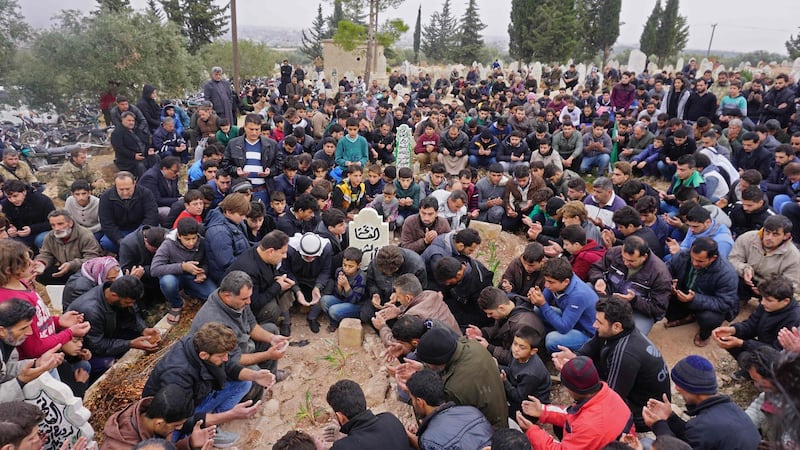Yet another tragic loss. Syrians and those who care for Syria have spent the last three days in mourning. Mourning the Syrian journalist and activist Raed Fares, but also everything that he stood for – values of courage, patriotism and peaceful protest.
Raed reached millions of people around the world through the compelling banners he made in his hometown of Kafranbel. As the people around him bravely resisted the regime of Syria’s president Bashar Al Assad, he created messages that humanised ordinary Syrians striving for a better future. He did so in the hope of creating a sense of empathy and an international drive to save them. While his work was widely shared online, touching the lives of people across the globe, it was not enough to spur the necessary action to protect Kafranbel and other cities like it.
After two assassination attempts, last Friday Raed's enemies finally succeeded in killing him and his loyal friend Hammud Al Junayd. They join hundreds of activists, some of whom were also journalists, who have been killed in Syria. Mr Al Assad and the Islamist extremists now operating in Syria have several things in common, most importantly an utter rejection of peaceful, secular opponents, who reflect the wishes of many of their countrymen.
Initial reports say that such extremists were behind the killing of Raed and Hammud. Those same militants dominate Idlib − the last remaining Syrian province under rebel control, which the regime now has its sights set on. Idlib was not home to such groups until recently, but as part of siege and surrender tactics in areas such as Homs and Ghouta some were given safe passage there, while unarmed opposition members either had to flee the country or were killed.
The amount of times in recent years that analysts and diplomats have said “There are no good guys in Syria” is astounding. It is also an insult to peaceful opposition figures who have waited and worked so long and so hard for an end to the conflict. What they really meant to say was: “There are no good guys we want to work with.” There have always been good guys in Syria – people who want only to protect their country and refuse to sell it out. Too many of them, like Raed, have paid for their beliefs with their lives.
Peaceful activists in Syria are often cynical about UN efforts to end the war. The body’s convoluted attempts to achieve an orderly and non-violent transition are meant to restart soon. The constitutional committee, which has been lauded for months as the answer to this shattered nation’s problems now seems unlikely. In his penultimate briefing to the UN Security Council before he retires, UN Special Envoy for Syria Staffan de Mistura said that balance, inclusion and international legitimacy are “the litmus test” for the committee.
In his statement last week, Mr De Mistura said: “We may have to conclude that it may not be possible to form a constitutional committee [that is] credible and inclusive at this stage.” He was also clear that the UN was in the last days of its attempts to convene the committee. Nothing that has been said at this critical point provides any hope that these efforts will prove anything other than futile.
The Norwegian diplomat Geir Pedersen takes his position as the new UN Envoy for Syria at the beginning of next year. He faces a seemingly insurmountable task and a ravaged nation. Unlike his predecessors, he will also not benefit from having a pool of Syrians to work with in pursuit of a stable transition. And yet in order to avoid more deaths, like that of Raed and so many others, he must work with what he has.
Peace talks are, by their nature, difficult and capricious. Anyone who has ever been involved in them will tell you that. However, one factor is always the same. The main sides must be willing to negotiate. That is still missing in Syria.
As a result, civilian populations continue to suffer. The latest news of a chemical attack in Aleppo proves once more the government’s failure to protect its citizens – if it is not the one attacking them. This week, the regional director for the International Committee of the Red Cross was in Aleppo. There, he gave a statement in which he described the scale of the destruction as “incredible”.
Like the devastation of Aleppo, the pain of losing Raed will not go away time soon. Raed, Hammud, the Damascus-based activist Hani Abdullah, the 200 brave rescuers of the White Helmets who have lost their lives. The list goes on, the names running into the thousands. Among them are some of the best minds Syria and the wider Arab world had. And now we have lost them forever.
But we have not lost everything. During the Arab uprisings of 2011, young patriots rose up in numerous countries. There were those were neither militant nor Islamist, who had a simple vision of a nation state that served its people. Their thundering calls for dignity were heard around the world. Yet without weapons and money, and with autocrats and extremists colluding against them, their voices were silenced. Their ideas, however, remain alive.





